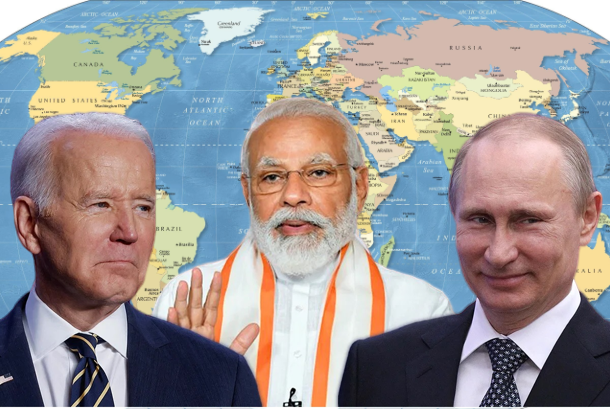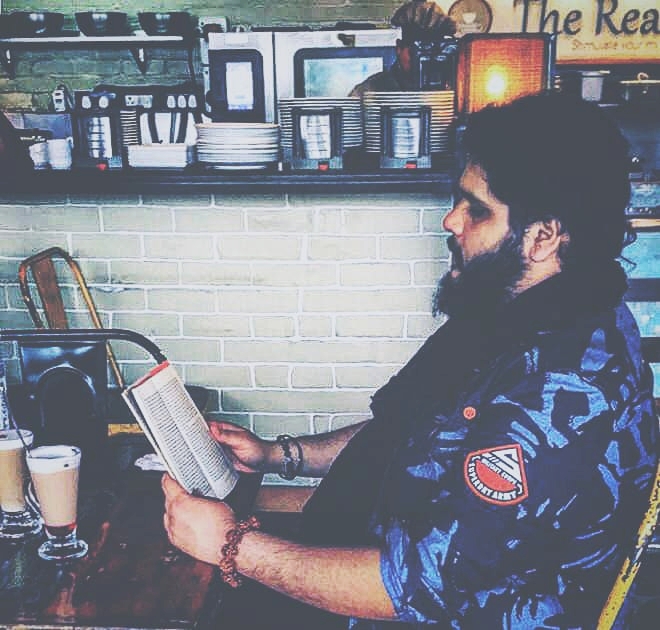Does the engagement with the United States mean that India will let go of a less productive but beneficial relationship with Russia? Does it mean that India will start exhibiting an anti-Russian attitude of sorts, just like the former Soviet Bloc nations like Latvia and Moldova are doing?

The world is presently occupied with India’s closeness with the United States of America. At times, the optics around these visits make people who favour Russia and China uneasy. Experts from all corners attempt at downplaying these ties or make multiple predictions around India’s monkey-balancing with both US and Russia. But that seems a little different from the kind of realistic ties the Kremlin shares with New Delhi. Moreover, the focus of India’s strategic autonomy lies on a different target altogether.
It makes it easy for many people to express their doubt as the world saw that the Indian Prime Minister approved a lot of deals around defence, technology and aviation. Wide discussions were held with multiple US companies and important figures like Elon Musk expressed his fascination with the Indian PM and spoke1 about the excitement around his visit to India in 2024 and the kind of investments he wishes to bring to the subcontinent. Scientists like Neil deGrasse Tyson remarked positively about the Prime Minister’s influence and gave a statement2 that the ‘Sky is not the limit for PM Modi’. In fact, positive reactions made by Lockheed Martin, Airbus and others came while Vice President, Kamala Harris recounted her past in Tamil Nadu. The Prime Minister’s address to the US Congress was no less than historic and the repeated standing ovations stand testament to this fact.
India understands the importance of maintaining bridges within a multipolar framework which is stressed by the Prime Minister repeatedly in all forums and speeches.
Such things only hint at the Indian strategy under the current administration which is that the textbook balance of relations is nothing less than a reinforced push diplomatically by both sides. The Joint address by the Prime Minister and the United States President is a result of these diplomatic overtures only. An article on their joint address analysis around how the two leaders conducted and possibly, took the ties of their respective countries to new heights. Often at times, naysayers and others who show genuine concerns about our diplomatic strategies wonder about many scenarios and draw a lot of conclusions. Some of them represent the old approaches of a suspicious America that only wishes to control us and poke us at times. This further got enhanced when former president Barack Obama had an interview with CNN’s Christiane Amanpour and spoke about India’s apparent internal implosion. Multiple responses were issued against this interview and the White House was forced to distance itself from that comment and remarked that it was made3 in his personal capacity.
In light of such events, many people wonder whether the Indo-US ties could hamper our ties with the Kremlin. It is a noted fact that India stands neutral and continues to push for peace and dialogue in the Ukrainian crisis. The US-led West has been against the Russian Federation since the Minsk agreements in 2015. The Russian strategy clearly hints at reducing the hegemony of the dollar as well as the importance of a Europe being led by the Americans. Recently, the strategic town of Bakhmut was liberated and while Putin, with Belarusian President, Alexander Lukashenko handled the brief 20-hour rebellion by the Russian Private Military Contractor, Wagner, Prime Minister Modi was finishing his trip to Washington and went to Cairo where he received the highest state honour to a foreigner.
An Unsettled Russia?
Does the engagement with the United States mean that India will let go of a less productive but beneficial relationship with Russia? Does it mean that India will start exhibiting an anti-Russian attitude of sorts, just like the former Soviet Bloc nations like Latvia and Moldova are doing?
I firmly disagree because not only is that laughable but also unrealistic. Yesterday itself, the NSA Ajit Doval had a phone call with his counterpart in Moscow, Nikolai Patrushev and the Russian official briefed4 the Indian counterpart about the recent developments in the Russian region. At this point, our strategic autonomy is to have multipolar engagements with all power centres throughout the course of time. It only means a continued engagement with multiple sides that may or may not be present in some of these events that define our world as we live today.
Moreover, our economic relationship with Russia has increased in multiple folds, the Russian banking system is in the final stages to have a ‘Ruble – Rupee’ exchange and it is our largest oil supplier today. Plus, regardless of any development in our US, Brahmos is our biggest collaboration with Russia as well as our nuclear reactors for years now. Russia allows us important access into Central Asia as reports now suggest that even Tajikistan and Iran want to trade with local currencies and replace the dollar. This is incredibly significant because all of these nations are a part of the 7,200 km long multimodal International North-South Transport Corridor (INSTC)5 connecting India and Russia. So the question of reducing our engagement with the Russians is nothing but a miscalculation. And that is exactly what the NSA said to his Russian counterpart, assuring him of continued support in all major forums they participate in.
China and OIC are the targets?
If our strategic engagement is actually against someone, it is more to do with subverting geopolitical moves made by the People’s Republic of China and the Organization of Islamic Cooperation ( OIC ). Today, these two are more or less considered the first respondents to any positive news coming around India and often try to reduce the importance of it. Whether it was the Chinese blocking Indian and American proposals at UNSC to blacklist top Lashkar-e-Taiba (LET) commander, Sajid Mir or the OIC trying to portray that Muslims were particularly targeted during Ram Navami, it is clear that India has started focusing more towards these two and Pakistan, being a prominent OIC member shares a close relationship with Beijing. Recent reports suggested that China allegedly was not happy with the visit to the US and Egypt. The Chinese have been trying to get their way with the Egyptian head of state, as any movement by India to curb its influence makes them nervous. Pakistan itself faces a lot of confusion and is in no position to try and pressure India or the US anymore. Its heavy dependence on China continues, and that is another event altogether.
Another target that I feel is multiple agencies that like to weave narratives and opinions to try and change perceptions around India’s internal and external aspects. That continues without any slowing of pace, and the motivation remains steadfast as the general elections come closer to the Indian subcontinent. There are vested interests in anyone’s mind to try and downplay India’s importance in the global South regardless of anything, and it shall remain the same. Such agencies change, but time is of the essence. We cannot instantly change our fortunes through their mouths. And that is something the Indian government slowly understands and forms ways to address with time.
Conclusion
This quote by the current Indian Foreign Minister, Dr S. Jaishankar, in his book, The India Way6 provides a suitable argument for this belief.
“This is a time for us to engage America, manage China, cultivate Europe, reassure Russia, bring Japan into play, draw neighbours in, extend the neighbourhood and expand traditional constituencies of support.” – Dr S Jaishankar
The Indian push to engage with multiple power centres is perhaps justified by this outlook taken by the foreign minister. It wishes to keep all channels open for productive engagement that benefits both sides but, more so, India’s vision for the world. It would be immature to suggest that India will undervalue its longest ally and sabotage its relationship with Russia when an aggressive China under Xi Jinping tries to undermine our place in the world. Moreover, I2U2-styled engagements that bring prospective allies from West Asia aim at countering both the Dragon and the OIC today is the best approach. India understands the importance of maintaining bridges within a multipolar framework which is stressed by the Prime Minister repeatedly in all forums and speeches. It is safe to say this won’t be changing anytime soon.
(Anhad Jakhmola is a postgraduate scholar in international relations. He has his undergraduate degree in history and is pursuing his PhD in Defence and Strategic Studies.)
References:
[1] Chidanand Rajghatta, Home Elon: Modi-Musk talks pave way for Tesla-SpaceX entry to India, Delhi, Times Of India, 2023.
[2] Geeta Mohan, ‘Sky is not the limit for PM Modi’: Neil deGrasse Tyson says India’s potential knows no limit, New York, Business Today, 2023.
[3] Prashant Jha, Private citizen, no coordination with White House’: Senior official to HT on Obama’s comments during Modi’s US visit, Washington, Hindustan Times, 2023.
[4] Anirban Bhaumik, India’s growing cooperation with US won’t impact Russia ties: NSA Doval, Delhi, Deccan Herald, 2023.
[5] Mahua Venkatesh, Will the Indian rupee and Russian ruble rule transactions along the 7,200 km transport corridor in the future? , Delhi, India Narrative, 2023.
[6] S. Jaishankar, The India Way, India, HarperCollins Publishers, 2022, pg. 10

